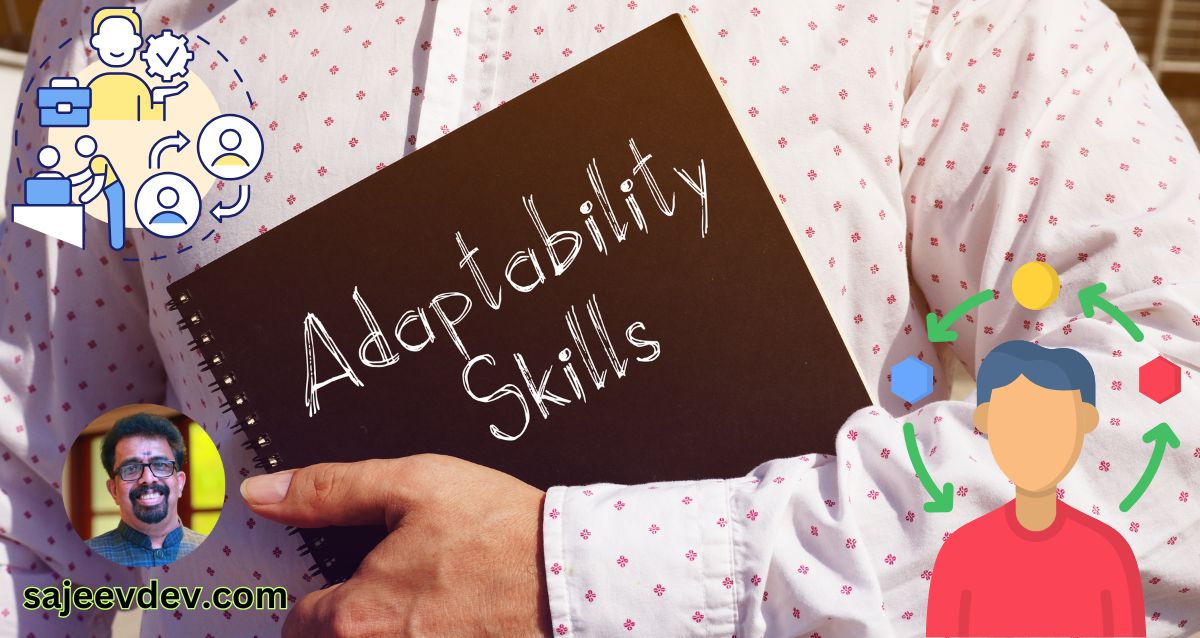Adaptability refers to the ability to adjust to new conditions and effectively respond to the challenges presented by a constantly changing environment
Adaptability refers to the ability to adjust to new conditions and effectively respond to the challenges presented by a constantly changing environment. In today’s fast-paced world, where technological advancements and social dynamics are in perpetual flux, adaptability has become an essential skill. It allows individuals and organizations to navigate uncertainties and seize opportunities, which is critical for achieving success in various spheres of life.
Adaptable individuals typically demonstrate a range of characteristics that enable them to thrive amid change. They are often open-minded and willing to embrace new ideas, which fosters innovation and creativity. They also possess a growth mindset, meaning they view challenges as opportunities for development rather than insurmountable obstacles. Additionally, adaptable individuals exhibit resilience; they can bounce back from setbacks and maintain a positive outlook, even in difficult circumstances. This psychological strength is crucial for overcoming adversity and ensuring sustained progress.
Emotionally, adaptability involves the capacity to manage stress and maintain emotional stability in the face of uncertainty. People who are adaptable tend to have strong emotional intelligence, allowing them to navigate their own feelings and recognize emotional cues in others. This skill can enhance interpersonal relationships and improve teamwork, as adaptable individuals can effectively communicate and collaborate, even when circumstances change rapidly.
Ultimately, understanding adaptability encompasses recognizing its multifaceted nature—combining cognitive flexibility, emotional intelligence, and a proactive approach to change. By cultivating these traits, individuals can enhance their adaptability and better equip themselves to navigate the complexities of an ever-evolving world. The ability to adapt not only fosters personal growth but also positions individuals and organizations for long-term success in a time marked by unpredictability.
The Importance of Adaptability in the Modern World
In today’s fast-paced environment, adaptability has emerged as a crucial skill across various domains, including personal relationships, career advancement, and social dynamics. The term refers to the ability to adjust one’s thoughts and actions in response to changing situations and circumstances. As technological innovations continue to reshape industries and societal norms evolve, those who can thrive amid uncertainty are more likely to succeed.
On a personal level, the shift in lifestyle patterns, largely brought about by digital advancements, requires individuals to possess a flexible mindset. This adaptability allows one to navigate new forms of communication, manage work-life balance, and engage in lifelong learning. By being open to change, individuals can cultivate resilience, enabling them to handle stress and recover from setbacks effectively.
In the workplace, adaptability has become vital due to the rapid evolution of job roles and the emergence of new industries. Traditional careers may no longer provide the stability they once did, necessitating a proactive approach to skill enhancement and versatility. Those who embrace change and seek opportunities for professional development often stand out, making them more attractive candidates for roles that demand innovation and creative problem-solving. Furthermore, teams that embody adaptability tend to collaborate more effectively, leading to increased productivity and improved outcomes.
Socially, the ability to adapt plays a significant role in interpersonal relationships. The globalized world has brought diverse cultures and perspectives into closer contact, requiring individuals to remain open-minded and understanding. This adaptability fosters stronger bonds and enhances communication, enabling people to navigate complex social situations with ease.
Thus, adaptability is not just a desirable trait; it is an essential superpower in the modern world, poised to facilitate success across personal, professional, and social landscapes. Its significance will only continue to grow as we face an increasingly unpredictable future.
The Benefits of Being Adaptable
Adaptability plays a crucial role in navigating the complexities of modern life. One of the primary advantages of being adaptable is the improvement in problem-solving skills. When individuals are open to change and willing to explore alternative solutions, they are more likely to tackle challenges effectively. This ability can be particularly valuable in professional settings, where unexpected obstacles may arise. For instance, consider a project manager who successfully adjusts project timelines and reallocates resources when faced with unexpected setbacks, demonstrating that flexibility can lead to innovative solutions.
Moreover, adaptability fosters resilience in the face of adversity. Individuals who embrace change tend to bounce back more quickly from setbacks, viewing them as opportunities for growth rather than insurmountable barriers. This resilience not only helps in overcoming personal challenges but also instills a sense of confidence in one’s ability to handle future difficulties. An example can be seen in athletes who, after suffering an injury, alter their training regimens to accommodate their recovery while maintaining progress. Such resilience reinforces the notion that challenges can be navigated successfully with the right mindset.
Another significant benefit of adaptability is enhanced creativity. When people are willing to shift perspectives, they are often more inclined to think outside the box and explore unconventional ideas. This openness can result in groundbreaking innovations and fresh approaches to old problems. A notable example includes successful entrepreneurs who pivot their business models in response to evolving market demands, showcasing that adaptability can be a catalyst for creativity and business growth.
Finally, individuals who cultivate adaptability often experience greater overall satisfaction in life. This sense of fulfillment arises from a greater capacity to manage change and uncertainty, leading to healthier relationships, improved mental well-being, and a more positive outlook on life. Thus, the numerous benefits of being adaptable collectively enhance one’s quality of life and success in various endeavors.
Cultivating an Adaptable Mindset
Developing an adaptable mindset is essential in navigating the complexities of today’s dynamic environment. One effective strategy to begin this journey is to embrace change. Acknowledging that change is a constant factor in life allows individuals to approach new situations with openness rather than resistance. This perspective can be cultivated through everyday experiences by seeking opportunities that push one’s comfort zone, thus enhancing resilience and flexibility.
Fostering a growth mindset is another crucial component of adaptability. This involves embracing the belief that abilities and intelligence can be developed through dedication and hard work. To nurture this mindset, individuals should recognize the value of effort, appreciate constructive criticism, and see setbacks as opportunities for learning rather than defeat. By viewing challenges as learning experiences, one can foster an attitude of lifelong learning that is integral to an adaptable mindset.
Learning from failures is equally important. Instead of feeling discouraged when confronted with setbacks, individuals should reflect on these experiences to identify lessons that can be applied in the future. A systematic approach to evaluating failures can aid in understanding what went wrong and how similar situations can be managed differently in the future. This reflection transforms failures from mere disappointments into valuable stepping stones toward growth.
Furthermore, remaining open to new experiences can greatly enhance adaptability. Engaging with new ideas, cultures, and practices broadens one’s perspective, enabling a more nuanced understanding of the world. Techniques such as mindfulness and self-reflection can facilitate this openness, allowing individuals to process their thoughts and emotions effectively. Mindfulness encourages present-moment awareness, fostering a sense of calm that aids in embracing new experiences without fear or anxiety. Self-reflection provides clarity, enabling individuals to assess their adaptability skills and make adjustments as necessary.
Overcoming Resistance to Change
Adaptability is a crucial skill in today’s dynamic environment, yet many individuals struggle with the psychological barriers that hinder their ability to embrace change. One of the most common fears associated with change is the unknown. Individuals often find comfort in familiar routines, and the prospect of altering these can provoke anxiety. This fear of the unknown can manifest as resistance, leading to an unwillingness to accept new circumstances or processes. Additionally, misconceptions about change can exacerbate this resistance. For instance, some may incorrectly perceive change as a threat to their competency or security, thus building psychological walls against it.
To overcome these barriers and cultivate adaptability, reframing thoughts is a highly effective strategy. This technique involves altering one’s perspective on change, viewing it not as a setback, but as an opportunity for personal growth and development. For example, individuals can shift from thinking, “I will never be able to do this,” to a more positive outlook such as, “I can learn and develop new skills through this experience.” This cognitive shift encourages an open mindset, allowing individuals to confront change with a proactive attitude.
Another vital strategy is seeking support from others. Engaging with peers, mentors, or support groups can provide emotional reassurance and practical advice. Sharing experiences can illuminate the benefits of change, allowing individuals to see that they are not alone in their struggles. Communicating fears openly can further reduce anxiety and build collective resilience. By harnessing these strategies, individuals can dismantle the psychological barriers that inhibit adaptability, transforming their approach to challenges. Ultimately, confronting and overcoming resistance to change paves the way for enhanced personal and professional growth.
Thriving in Uncertainty
In a world that is often characterized by rapid change and unpredictability, adaptability emerges as a crucial skill for thriving amid uncertainty. Individuals who cultivate adaptability are better equipped to face challenges and navigate the complexities that come with ambiguous circumstances. By embracing flexibility and resilience, one can not only manage but also flourish in situations where outcomes are unclear.
One of the key elements of thriving in uncertain environments is effective decision-making. The ability to make informed decisions quickly, even when information is incomplete or contradictory, distinguishes adaptable individuals. This involves assessing risks with a critical eye and considering multiple perspectives before arriving at a conclusion. Establishing a framework for decision-making can help streamline this process. For example, utilizing pros and cons lists, scenario planning, or the six thinking hats technique can facilitate clearer thinking and enhance the decision-making process, allowing for informed choices in uncertain times.
Another vital aspect of adaptability is developing a growth mindset. Individuals with a growth mindset view challenges as opportunities for learning rather than obstacles to avoid. This perspective encourages experimentation and innovation and fosters resilience in the face of setbacks. By focusing on continual learning and being open to feedback, individuals can better adjust their strategies as situations evolve. Furthermore, surrounding oneself with a diverse network can provide invaluable insights and support, further aiding adaptability in uncertain circumstances.
Ultimately, adaptability is not merely about surviving uncertainty but thriving within it. By honing decision-making skills, embracing a growth mindset, and leveraging support from others, individuals can navigate the intricacies of a constantly changing world with confidence. Becoming adept at adapting to new information, changing conditions, and unexpected outcomes will empower one to meet challenges head-on, fostering success and personal growth in the long run.
Adaptability in the Workplace
In today’s fast-paced professional environment, adaptability has emerged as a critical skill for success. Organizations are facing unprecedented changes due to technological advancements, shifting market dynamics, and evolving employee expectations. The ability to adapt not only enhances individual career trajectories but also contributes to the overall effectiveness of teams and the leadership within a company.
Being adaptable in the workplace fosters career growth by enabling employees to navigate changes and challenges effectively. Professionals who embrace flexibility are often seen as valuable assets, as they can swiftly adjust to new roles, responsibilities, and work processes. This adaptability enhances their employability, as employers increasingly seek individuals who can thrive in uncertainty and facilitate progress amidst adversity. Furthermore, those who display a willingness to learn and adapt often find themselves advancing faster in their careers, as they become more attuned to the needs of their organizations.
Adaptability also plays a significant role in improving teamwork. In collaborative environments, individuals must be open to diverse perspectives and approaches. An adaptable team member is more likely to listen to others, consider alternative solutions, and pivot strategies when necessary. This fosters a culture of innovation and inclusivity, enhancing overall team dynamics and productivity. Moreover, adaptable teams can respond more efficiently to project shifts or emergencies, ensuring that goals are met despite unforeseen challenges.
Leadership is another area where adaptability is crucial. Effective leaders inspire their teams by exemplifying resilience and a positive attitude in the face of change. They create a culture of adaptability by encouraging open communication, promoting continuous learning, and recognizing individual contributions to collective success. When leadership prioritizes adaptability as a core value, organizations are better positioned to confront challenges and seize new opportunities, ultimately driving sustainable growth.
Real-Life Examples of Adaptability
Adaptability is a crucial trait that can significantly influence the success of both individuals and companies in the face of challenges. Numerous real-life examples illustrate how the ability to adjust and innovate can lead to resilience and remarkable success.
One notable example is that of Netflix, which remarkably transformed its business model in response to changing consumer habits. Initially a DVD rental service, Netflix adapted by shifting its focus towards streaming in the early 2000s. This pivot not only enabled the company to remain relevant in the evolving entertainment market but also positioned it as a leading player in the industry. The foresight to embrace digital transformation allowed Netflix to innovate continuously, resulting in the production of original content that further captivated global audiences.
Another inspiring case is that of Microsoft during the leadership of Satya Nadella. Upon assuming the role of CEO in 2014, Nadella recognized the need for a cultural shift within the organization. By emphasizing a growth mindset, collaboration, and inclusivity, he instigated profound changes that rejuvenated Microsoft’s workforce. This adaptability not only improved employee morale but also led to the development of cutting-edge products and cloud services that have become cornerstones of the company’s growth.
On an individual level, consider the story of a small-business owner who faced significant adversity during the COVID-19 pandemic. This entrepreneur quickly adapted to the crisis by pivoting from in-person services to offering virtual consultations and online products. Leveraging social media platforms, the owner managed to connect with a broader audience, ultimately not just surviving the pandemic but emerging stronger and more innovative.
These examples underscore the significance of adaptability, demonstrating that whether at the corporate or individual level, the capacity to embrace change can lead to innovation, success, and sustained resilience in an ever-evolving world.
In today’s rapidly evolving world, the ability to adapt has emerged as a crucial skill for personal and professional succes
In today’s rapidly evolving world, the ability to adapt has emerged as a crucial skill for personal and professional success. Throughout this discussion, we have explored the myriad ways in which adaptability serves as a superpower, enabling individuals to navigate the multifaceted challenges that arise from constant change. The significance of this ability cannot be overstated; it transcends mere coping mechanisms and instead represents a transformative mindset that fosters resilience and innovation.
We began by examining the nature of adaptability, highlighting that it not only involves adjusting to new circumstances but also entails a proactive approach to embracing change. This perspective allows individuals to perceive challenges not as obstacles, but rather as valuable opportunities for growth and development. Additionally, we delved into the various strategies that can enhance one’s adaptability, including cultivating a growth mindset, fostering emotional intelligence, and embracing continuous learning. These attributes empower individuals to engage flexibly with their environments, ultimately enhancing their performance and satisfaction in various spheres of life.
Furthermore, it is essential to recognize that adaptability is not solely an inherent trait but a skill that can be developed over time. By consciously seeking out new experiences and stepping beyond comfort zones, individuals can strengthen their capacity to adapt. This process of embracing adaptability equips individuals to face an unpredictable future with confidence and fortitude, transforming potential uncertainties into avenues for personal and professional advancements.
In summary, embracing adaptability as a superpower is an empowering choice that can significantly enhance one’s life experience. By recognizing its importance and actively cultivating this skill, individuals can unlock their potential and thrive amidst the complexities of a changing world. As we continue to encounter shifts in various aspects of life, let us collectively commit to viewing adaptability not as a challenge to overcome but as an essential tool for navigating our journey.



